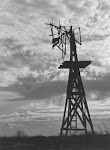Samuel Seely Griffin was the brother of our 3Gt Grandfather, Jonathan Griffin. They were sons of Benoni Griffin, jr., of Simsbury, CT. We don't yet know his mother's name except as "Miss Seely". He was born about 1776 in CT, but we first find him in 1798, West Virginia with his father and brothers, at the time he would become of age. The Bath Co VA 1798 tax list shows him as "one tithable", no slaves or horses. I believe his father died about that year, as during the next years, 1799 - 1803, Samuel paid taxes on 50 acres and a cabin built by Benoni on Beaver Lick Creek, formerly owned by Uncle Timothy Holcomb. In the next tax list he is found owning a horse. (a very important part of his future.)
We find that his wife was Elizabeth Ann Harris, daughter of Methodist Minister, Nathaniel Harris. Harris was one of the early founders of Bethel Academy in Kentucky. "Maybe" Samuel studied there and met Elizabeth. Our Samuel was present at the Methodist Conference in Cincinnati , 1809, with Bishop Francis Asbury and Rev. McKendree... well known in early Methodism. In 1811 he is commissioned for a year of Circuit riding Ministry in Kentucky.
From "The History of Methodism in Kentucky", p. 50, "The Rise of Methodism in the West":
"Perhaps the most notorious controversy between the Presbyterians and the Methodists during the life of the Western Conference was one which occurred in Cincinnati following the session of the conference in that city in 1811. While the conference was in session, three of the younger members, Peter Cartwright, Thomas Stilwell, and Samuel Griffin, took advantage of their stay in the city to have some pamphlets printed against Calvinism. One of the pamphlets was in poetical form or rather doggerel and was entitled "The Dagon of Calvinism, or The Molock of Decrees: A Poem in Three Cantos." It wasn't sanctioned by the Conference, but caused an uproar between Presbyterians and Methodists. There are pages and pages in Methodist histories, describing the controversy between certain Presbyterian leaders and the Methodist Conference, but no action or punishment was taken against the three young preachers.
The assignment Samuel was given was to the "Limestone Circuit" in Kentucky. His father-in-law lived in that area which stretched from Maysville KY on the Ohio River, down to the lower part of Kentucky near London. This southern area is where we find Samuel and his young family had settled down by 1820. In today's maps we see the Daniel Boone National Forest, so we know this was not an easy area for him to ride for ministry. Francis Asbury who sent out these men, and traveled the state himself, said "We must reach every section of
America, especially the raw frontiers. We must not be afraid of men, devils,
wild animals, or disease. Our motto must always be FORWARD!" The circuit riding preachers often rode 40 miles between settlements where they could preach or even sleep. They were called "saddlebag" preachers, carrying their Bible and few belongings along on their treks. There are diaries kept by Asbury and some others who shared the details of the grueling life as well as the victories for their Lord.
After the War of 1812, Samuel received bounty lands in Ohio and Illinois, where he settled at the end of his days, having lived at the edge of the nation's frontier for over 40 of his 64 years. His tombstone says Rev.S. S. Griffin.
